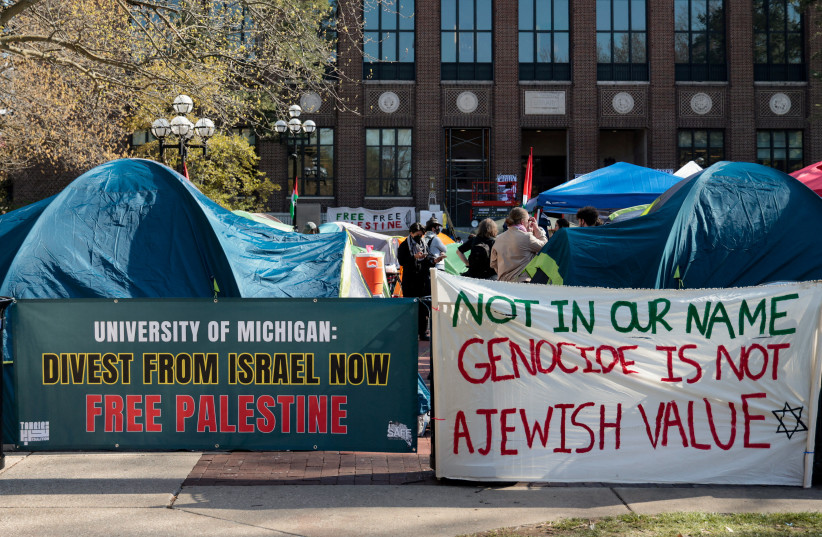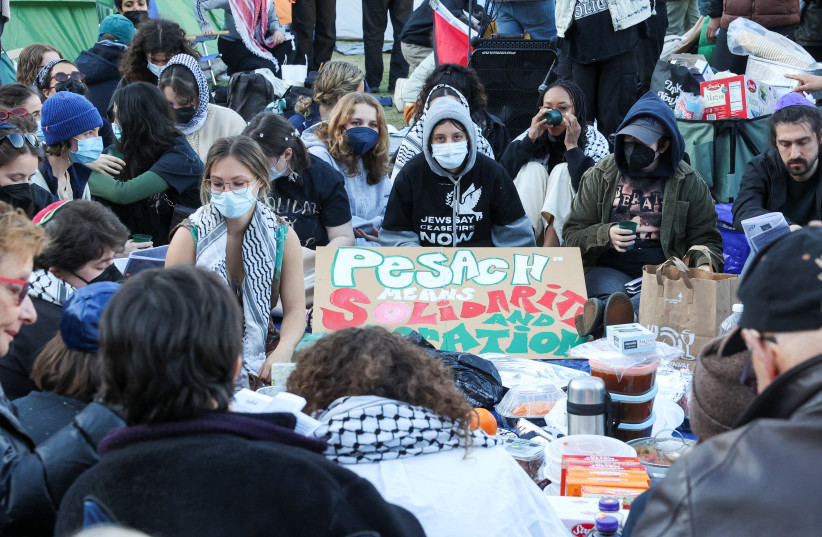Let’s talk about the handful of Jewish students who attend these antisemitic pro-Hamas protests across campuses.
For weeks now, pro-terror students across American universities have gathered on their respective campuses in what they call “anti-Israel encampments’ or “liberated zones.” They illegally pitch tents on campus lawns even though some students were banned, suspended or even arrested.
These hundreds of students and some faculty member claim that these are peaceful protests despite the very well-documented evidence that vicious antisemitic, pro-Hamas and pro-terror sentiments have been expressed. They argue that the fringe few who have attacked Jews do not represent their entire cause, which they believe is a just one.
Fringe Jews are not the majority
One of the main arguments that they use to mask their antisemitism is that a small fraction of Jews attend these protests and have even been arrested because they support the cause. The Jews at these antisemitic encampments even hosted a Passover Seder at Columbia University (the irony).
Let’s be clear: there is nothing peaceful about these protests. The vicious antisemitism is not coming from a handful of people who are violent; it’s the very ethos of these protests. Using a tiny handful of Jews as a way to mask their antisemitic nature is gaslighting the vast majority of Jewish students who no longer feel safe on campus.

I struggle to understand how anyone can take the select few and think that those people are now spokespeople for the entire community. Does membership of a specific community mean they cannot harm the collective?
When Kanye (Ye) West, a Black rapper and musician, said that the 400 years of slavery was a choice, does that not harm the entire Black community even if the person who is saying it has the same skin color? Why on earth would anti-Israel Jews be any different when 95% of the Jewish community are Zionists and believe that Israel’s existence is integral to their security?
It hurts me to point to the Holocaust, where we also witnessed how a fringe minority of Jews would end up harming and betraying the collective community. The term Kapo referred to a prisoner in a Nazi camp who the SS guards assigned to supervise the labor camps, purposefully designed to turn victim against the victim. The Kapos were spared from physical abuse and hard labor if the SS guards were satisfied with their performance.
There was also the Judenrat in German, which meant “Jewish Council,” an administrative body established by the Nazis, which were responsible for implementing Nazi policies to the rest of the Jewish community. The Judenrat’s responsibilities would include reporting the numbers of their Jewish populations, clearing residences and turning them over, presenting workers for forced labor, confiscating valuables, collecting tribute and turning these over. In general, the Judenräte represented the elite from their Jewish communities and were often in charge of security and control of the ghettos.
Both of these are upsetting examples of how the “good Jews” acquiesced to the demands of antisemites and harmed the larger collective Jewish community. There are plenty of Jewish Zionists, myself included, who support Palestinian liberation and a safe and secure two-state solution for both people. The sad reality is that many of those Jews were murdered on October 7 by Hamas terrorists.
Yet, the tokenized Jews at these encampment protests do not represent a community that is advocating for safety and security for both people because they are actively participating in a movement that is calling for the genocide of the Jewish people and is harming the safety and security of the Jewish state.
The reality is that the people who are weaponizing Jewish presence at these protests don’t care about Jewish people. The global Jewish community overwhelmingly supports the existence of the State of Israel and believes it is integral to the safety of Jewish people worldwide. Using a fringe minority of Jewish people and silencing the overwhelming 95% is called tokenism.
Moreover, it feeds into the “good Jew” versus “bad Jew” trope, a strategy used by antisemites to mask their Jew hate by claiming they cannot possibly hate Jews since they are friendly with a handful whom they agree with. A “good Jew” is someone who shares the same views as the antisemites, meaning they have politically correct and progressive opinions. Those who challenge the viewpoints of the antisemite – in this case, the overwhelming majority who support Israel – are considered “bad Jews.”

The only ones who are safe are the Jewish students who sit in these encampments and agree with what these pro-Hamas students want. Using the handful of Jews at these protests to detract from antisemitism is equivalent to someone who uses minorities in their friendship circles to justify the racist things they say. Knowing a group of Jewish people does not mean you can’t be antisemitic and does not mean you understand antisemitism. Moreover, interacting with a couple of Jewish people does not mean that you can infer how Jewish people collectively think.
The writer is a social media activist with more than 10 years of experience working for Israeli and Jewish causes and cause-based NGOs. She is the co-founder and COO of Social Lite Creative, a digital marketing firm specializing in geopolitics.
